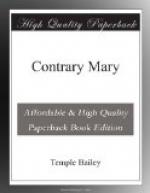Thus the spring came, and the early summer, and Barry passed his examinations triumphantly, and came home one night and told Mary that he was going to marry Leila Dick. As he told her his blue eyes beseeched her, and loving him, and hating to hurt him, Mary withheld the expression of her fears, and kissed him and cried a little on his shoulder, and Barry patted her cheek, and said awkwardly: “I know you think I’m not worthy of her, Mary. But she will make a man of me.”
Alone, afterward, Mary wondered if she had been wise to acquiesce—yet surely, surely, love was strong enough to lift a man up to a woman’s ideal—and Leila was such a—darling.
She put the question to Roger Poole that night. In these warmer days she and Roger had slipped almost unconsciously into close intimacy. He read to her for an hour after dinner, when she had no other engagements, and often they sat in the old garden, she with her note-book on the arm of the stone bench—he at the other end of the bench, under a bush of roses of a hundred leaves. Sometimes Aunt Isabelle was with them, with her fancy work, sometimes they were alone; but always when the hour was over, he would close his book and ascend to his tower, lest he might meet those who came later. There were many nights that he thus escaped Porter Bigelow—nights when in the moonlight he heard the murmur of voices, mingled with the splash of the fountain; and there were other nights when gay groups danced upon the lawn to the music played by Mary just within the open window.
Yet he thanked the gods for the part which he was allowed to play in her life. He lived for that one hour out of the twenty-four. He dared not think what a day would be if he were deprived of that precious sixty minutes.
Now and then, when she had been very sure that no one would come, he had stayed with her in the moonlight, and the little bronze boy had smiled at him from the fountain, and there had been the fragrance of the roses, and Mary Ballard in white on the stone bench beside him, giving him her friendly, girlish confidences; she discussed problems of genteel poverty, the delightful obstinacies of Susan Jenks, the dominance of Aunt Frances. She gave him, too, her opinions—those startling untried opinions which warred constantly with his prejudices.
And now to-night—his advice.
“Do you think love can change a man’s nature? Make a weak man strong, I mean?”
He laid down his book. “You ask that as if I could really answer it.”
“I think you can. You always seem to be able to put yourself in the other person’s place, and it—helps.”
“Thank you. And now in whose place shall put myself?”
“The girl’s,” promptly.
He considered it. “I should say that the man should be put to the test before marriage.”
“You mean that she ought to wait until she is sure that he is made over?”




